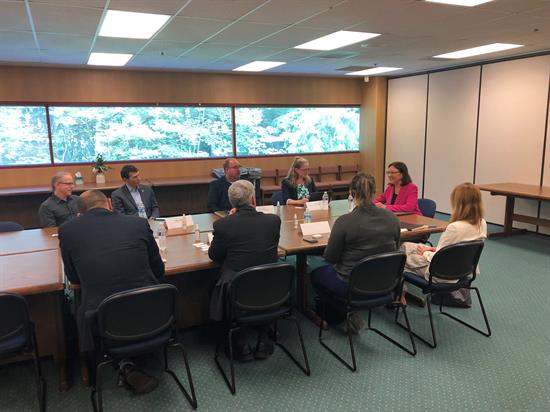Press Releases
DelBene Hosts Roundtable Highlighting Importance of Semiconductor Chips to Washington’s Economy and Impact of Global Chip Shortage
Washington, D.C.,
July 6, 2022
Today, Congresswoman Suzan DelBene (WA-01) hosted a roundtable with Washington business leaders to highlight the importance of semiconductors to Washington’s economy and the impact of the ongoing global chip shortage. This shortage has impacted a variety of industries, ranging from consumer technologies to defense and critical infrastructure, resulting in higher costs, production delays, and lay-offs. Semiconductor chips are critical for American economic competitiveness and are instrumental in technologies in nearly all sectors, including defense and aerospace technologies, medical devices, trucks, industrial equipment, consumer electronics, and other important Washington industries. In 1990, the U.S. made nearly 40% of chips globally. In 2020, that number dropped to 12% and is predicted to fall further without bold congressional action. “Many businesses in our state depend on semiconductors to innovate, compete, and keep workers on the job, but these industries are struggling to meet demand during the ongoing shortage,” said DelBene. “To ensure that Washington state leads the way in the 21st century, we need to invest in forward-looking solutions that will not only meet today’s needs but create more resilient and secure supply chains in the future. I will be sure to share what I learned from Washington business leaders today with my colleagues in Congress as we work to pass robust legislation that invests in American competitiveness and domestic semiconductor production capacity.”
“The CleanTech Alliance represents more than 1,000 member companies working to advance the clean technology sector to meet our nation’s climate and clean energy goals. Semiconductor shortages affect our ability to stay on track with those goals,” said Mel Clark, CleanTech Alliance President and CEO. “Clean technology industries need to build and deploy new technologies to decarbonize the built environment, create equitable access to clean energy, and employ a diverse workforce in STEM and good-paying union jobs. A semiconductor shortage holds our sector back from rapidly scaling solutions that impact real people in real communities across Washington and the nation. Representative DelBene recognizes the need for immediate action to support living wage jobs, American manufacturing, and clean technology adoption and we thank her for her leadership on this critical supply chain issue.” “It was an honor to meet with Representative DelBene earlier today to discuss the impact of the semiconductor shortage on American patients and healthcare professionals who rely on medical technologies,” said Mike Arena, SonoSite Vice President of Operations. “Pervasive shortages run the risk of crippling our industry and hampering the delivery of patient care. The government must do everything in its power to ensure that the healthcare system is prioritized amidst shortages of semiconductors, and we look forward to continuing to work together to put patients first.” “Ossia’s Cota® Real Wireless Power™ involves a rapidly growing ecosystem of manufacturing partnerships, technology development across hundreds of wireless power applications and customers commercializing products to take to market,” said Doug Stovall, Ossia CEO. “Development progress relies on the timely availability of key electronic parts. With the current global shortage of integrated circuit (IC) chips and other parts, all companies are experiencing significant impact on costs and timing. The pending legislation within the America COMPETES Act is critical to relieving the semiconductor shortages and advancing supply chain innovation.” DelBene helped the House pass the America COMPETES Act, which would invest $52 billion to bolster our American semiconductor manufacturing industry and accelerate research and innovation. In April, she was appointed by Speaker Pelosi to the bipartisan conference committee tasked with reaching a final agreement on the innovation legislation with the Senate. She has also introduced legislation to drive long-term investment in American production and design of semiconductors through tax incentives. Participants at the roundtable include:
|

